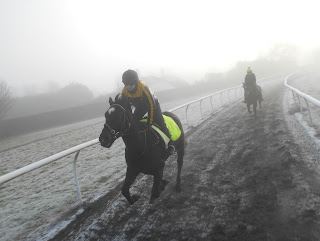Michael Haggas, who was Walter's agent from 1989 to 1995 and knew him very well, gave a lovely eulogy which hit all the right notes. Without quoting from Kipling or talking about things in such terms, he portrayed the struggle which we all face to a greater or lesser extent, the sometimes daunting task of treating those two impostors, Triumph and Disaster, both the same. He related how Walter would rationalize the bad days by observing that they merely served to help one to appreciate the good days all the more; and how he faced the inevitable tests which crop up through life with courage and with dignity.
Jockeying in one sense is a very easy way of earning a good living, and certainly most jockeys who become trainers generally end up saying that only now do they realize how easy they had it while they were riding. But there is one big problem which jockeys face which is an issue for few other professions: the dieting. It can make things very tough, and it certainly made things tough for Walter. Had he been born 20 years later it would have been different, but his riding career came while a jockey was still obliged to be able to ride at no higher than around 8:07 or 8:08 if he was to be taken seriously.
Nowadays, as George Baker and Adam Kirby demonstrate, a jockey, if he has enough talent, can forge a very good career riding no lighter than 9 stone. Walter would, relatively and figuratively speaking, have found that a piece of cake. But his riding days came marginally too early for that luxury, and he did seem to struggle as his career went on. Furthermore, like a lot of jockeys, particularly very successful ones, he possibly found retirement tough. Riding was his vocation, and I never felt that his heart was in the training the same way as it had been in the jockeying. In general, the withdrawal symptoms from ending a successful riding career are generally such that it comes as relief when one sees a retired top jockey settling happily into something else, rather than a surprise when he/she appears to find it hard.
Anyway, the gist of these reflections is that it would have been particularly nice for Walter to have been there today, to see just how many people he had standing so staunchly in his corner because (not least because he was naturally modest and, as Michael said in his tribute, did not possess the self-confidence which he displayed in the saddle when he was out of it) he would not necessarily otherwise have realized how popular he was. In general, there are all too many funerals which one attends and thinks, "I wish we had told him/her all this when he/she was alive!" It all goes back to one of the wisest pieces of advice: 'Don't leave it too late to tell someone you love them.'
In 'Singing My Hymn Song', Malachy McCourt, while recalling a time in his life when he was finding the going very heavy, explains that the secret to life is straightforward enough: all that one needs to do is to open one's heart and let God's love flow into it. Easy, isn't it? Well, not really, because at times that can be much easier said than done. We all need at times to remind ourselves that, for all its sham, drudgery and broken dreams, it is still a beautiful world, because it can become easy to overlook that fact. In fact, it can become easy not even to believe that fact.







1 comment:
Beautiful words again John
Post a Comment